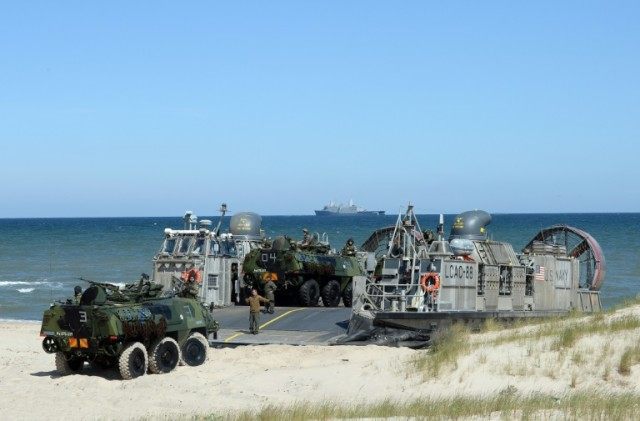Brussels (AFP) – Russia will use rare talks with NATO next week to protest the alliance’s “absolutely unjustified” military buildup in the Baltic states, Moscow’s ambassador to Brussels said Friday, adding the alliance was using the Ukraine crisis as a pretext.
Russia and NATO ambassadors will meet in Brussels on April 20 for their first formal talks in nearly two years to discuss security issues, including the crisis in Ukraine where Moscow is accused of backing pro-Russian rebels against the pro-Western government in Kiev.
“NATO decided under the pretext of the Ukrainian crisis to change this pattern” of behaviour toward Moscow, Russia’s permanent representative to NATO, Alexander Grushko, told reporters in Brussels.
“And today we are having a military buildup in the Baltic area, which from our point of view is absolutely unjustified,” Grushko said. “The shape of NATO-Russia relations is very bad.”
He said ties have been difficult since NATO suspended any practical cooperation with Moscow to protest its annexation of Crimea from Ukraine in March 2014.
Eastern NATO members including the formerly Soviet-ruled Baltic states and Poland have since lobbied the alliance to increase its presence in the region.
NATO and Russia last met in June 2014 amid mutual recriminations over who was to blame for the crisis in Ukraine, but the meeting next week is seen as a thaw in ties.
NATO envoys and their Russian counterpart had met regularly until the Ukraine crisis threatened what many thought could be a return to the deep freeze stand-off of the Cold War.
“NATO decided to enlarge, moved closer to Russian borders,” Grushko said.
“And then starting from 2014 NATO has been deploying additional forces, increasing its military activity on a rotational basis, adding equipment, creating permanent storage sites for military weaponry and equipment,” he said.
The alliance has also been “increasing the number and the size of exercises which are taking place in the areas adjacent to the Russian Federation,” he added.
“And of course that changes the military situation in the region,” even though the Baltic Sea was for years the safest region, he said.
“There were no frozen conflicts, no big problems,” Grushko said.
“NATO has to choose what kind of relationships it wants with Russia in the long term,” he added.
“I don’t see any possibility for a qualitative improvement of relations if NATO continues on its path of deterrence and relevant military planning,” said the ambassador.
In response to Russia’s intervention in Ukraine, NATO’s 28 members have agreed a major military revamp and dispatched troops, plus extra ships and planes to reassure its eastern European allies that they do stand alone.
Russia meanwhile has stepped up air patrols, leading to a sharp increase in NATO interceptions as both sides test out the other.

COMMENTS
Please let us know if you're having issues with commenting.